Even actresses had to escape the Nazi oppression as they moved into the heart of Paris. In Jean-Paul Rappeneau’s period movie from the mid-2000s, he imagines what it would be like to be this fastidious and self-obsessed actress as she tries to survive the Nazis and her lovers. In the same vein as Black Book, which I reviewed a couple of weeks ago, Rappeneau tries to take a dour subject and inflect some humor and airiness into it. The results are a mixed bag.
Isabelle Adjani plays Viviane Denvers. She is a French starlet who invites an old flame and friend, Frederic Auger, to help cover up a murder she had just committed. She talks him into putting the body into the back of a car and drive it away from her. As he drives, the rain on the windshields is too much and he ends up crashing into a police stand with the trunk popping open to reveal the dead man. The man is stuck in prison two years later when he finds his opportunity to escape. He leaves the prison as the rest of the population of Paris is leaving as well. He and a friend travel to Bordeaux and happen upon Viviane, wrapped in the arms of a minister, played by Gerard Depardieu. The triangle is complicated by the comely assistant to a professor who is trying to escape France with his heavy water, a substance used in manufacturing atomic bombs. As the assistant negotiates her professor’s exit, Frederic falls into the trap that is Viviane too many times to count. He cannot let go of this childhood crush. She seems to get pleasure out of manipulating him, her minister and the evil reporter/Nazi informer. Everyone is desperate to leave this overcrowded town, but saying that they want to leave and actually doing it is two very different things. Each character struggles to untwist their ties to Bordeaux and escape without anyone finding out what their true intentions are. This is the impetus to many incidents in the twisty turny plot.
I compared this movie to Black Book in the first paragraph for a reason. While Black Book took one woman’s struggle to stay alive in occupied Belgium and injected it with cartoonish violence, Bon Voyage takes this plot and plays it for laughs. But it also tries its hardest to impart the import of the events happening around the characters. This combination produces odd moments and a schizophrenic attitude in me. Am I supposed to be laughing or crying? Or both? The opening scenes give a great distillation of the movie overall. We see Viviane attending a premiere of her own movie. While watching the film, she does this over the top reaction to a man twisting in his seat to look at her on the balcony. Moments later, an important politician, Beaufort (Depardieu) trips over the stairs in order to talk to her. She is at one point in fear for her life and the next tittering and flattered that such a man would pay attention to her. Now imagine the threat of the man turning in his chair and the awkward humor manifested in Beaufort tripping, stretched out to over two hours. It becomes exhausting to say the least.
The plot twists come at the screen in an almost whip-lash like speediness. Nothing rests, nothing stays the same for very long. I don’t really get to know the characters as full, fleshed out characters, just how they relate to the plot. When Beaufort disappears for the last third of the film, I do not miss him although he was so integral to the plot in the first two-thirds. It seems as if he had vanished from the screen all together. The same happens to the professor and the friend. They only step in when the plot needs them too and not a moment before.
Comedy comes out of the even the most dour drama. I think that Rappeneau should have remembered that saying a little more throughout the shooting of this film.
